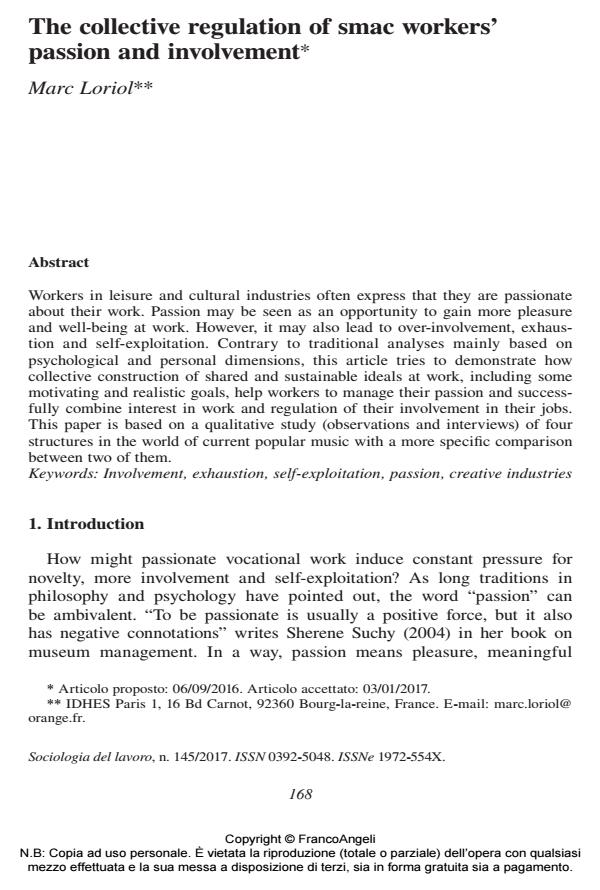The collective regulation of smac workers’ passion and involvement
Titolo Rivista SOCIOLOGIA DEL LAVORO
Autori/Curatori Marc Loriol
Anno di pubblicazione 2017 Fascicolo 2017/145
Lingua Inglese Numero pagine 16 P. 168-183 Dimensione file 106 KB
DOI 10.3280/SL2017-145010
Il DOI è il codice a barre della proprietà intellettuale: per saperne di più
clicca qui
Qui sotto puoi vedere in anteprima la prima pagina di questo articolo.
Se questo articolo ti interessa, lo puoi acquistare (e scaricare in formato pdf) seguendo le facili indicazioni per acquistare il download credit. Acquista Download Credits per scaricare questo Articolo in formato PDF

FrancoAngeli è membro della Publishers International Linking Association, Inc (PILA), associazione indipendente e non profit per facilitare (attraverso i servizi tecnologici implementati da CrossRef.org) l’accesso degli studiosi ai contenuti digitali nelle pubblicazioni professionali e scientifiche.
Workers in leisure and cultural industries often express that they are passionate about their work. Passion may be seen as an opportunity to gain more pleasure and well-being at work. However, it may also lead to over-involvement, exhaustion and self-exploitation. Contrary to traditional analyses mainly based on psychological and personal dimensions, this article tries to demonstrate how collective construction of shared and sustainable ideals at work, including some motivating and realistic goals, help workers to manage their passion and successfully combine interest in work and regulation of their involvement in their jobs. This paper is based on a qualitative study (observations and interviews) of four structures in the world of current popular music with a more specific comparison between two of them.
Gli studi sulle condizioni di lavoro nelle industrie culturali e del leisure eviden-ziano la centralità della questione dell’”appassionamento” al lavoro. In tali ambiti la passione può essere vissuta come coinvolgimento, motivazione e benessere. Tuttavia essa può contemporaneamente assumere dimensioni critiche di frustra-zione e auto-sfruttamento delle quali occorre tenere attentamente conto nel mo-mento in cui si riflette su problemi di organizzazione e regolazione del lavoro. Con-trariamente ai risultati degli studi sviluppati principalmente in termini psicologici e su base individuale, questo contributo tenta di dimostrare come la condivisione di motivazioni collettive ideali, che individuino obiettivi realistici e sostenibili, possa contribuire a gestire positivamente la regolazione delle passioni al lavoro ed infine a coniugare la composizione degli interessi in campo. Il contributo è basato su di uno studio qualitativo (osservazioni e interviste) incentrato su quattro strutture esi-stenti nel mondo della musica popolare contemporanea e su di una più specifica comparazione tra due di esse.
Parole chiave:Coinvolgimento; auto-sfruttamento; passione; creative industries
- Fragilisation de la définition collective du travail bien fait… et emprise des indicateurs d’activité Marc Loriol, in Nouvelle revue de psychosociologie /2020 pp.63
DOI: 10.3917/nrp.029.0063 - Stress and Suffering at Work Marc Loriol, pp.197 (ISBN:978-3-030-05875-3)
- Pasión por el Trabajo: Evidencias de Validez Discriminante, Predictiva e Incremental Solana Salessi, Alicia Omar, in Psicologia: Ciência e Profissão /2018 pp.522
DOI: 10.1590/1982-37030004752017
Marc Loriol, The collective regulation of smac workers’ passion and involvement in "SOCIOLOGIA DEL LAVORO " 145/2017, pp 168-183, DOI: 10.3280/SL2017-145010